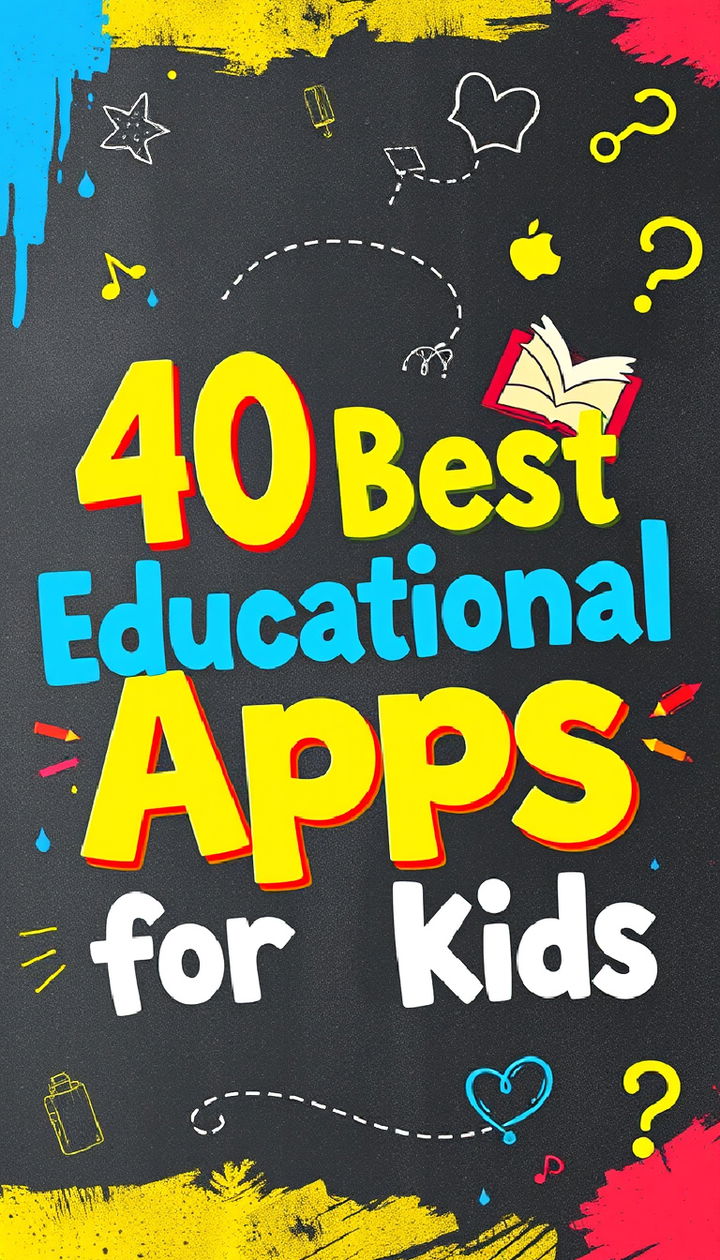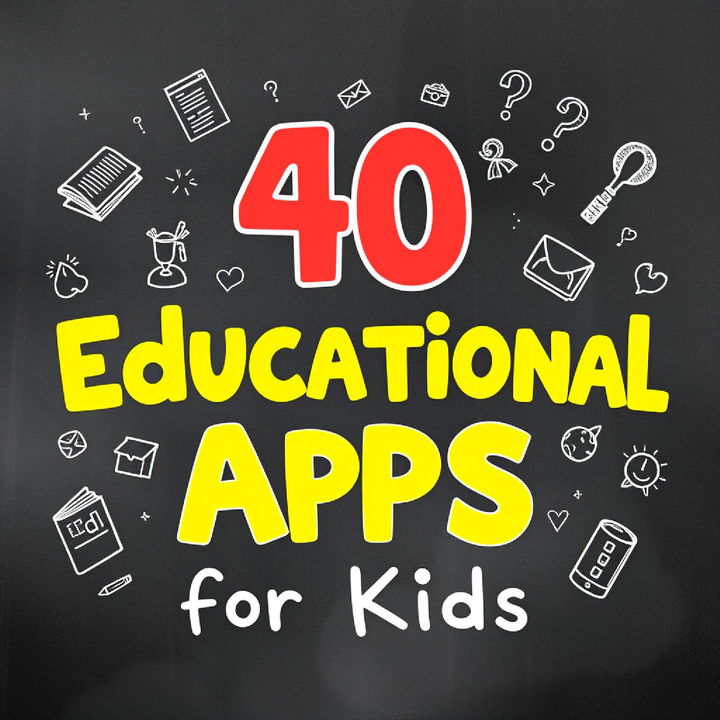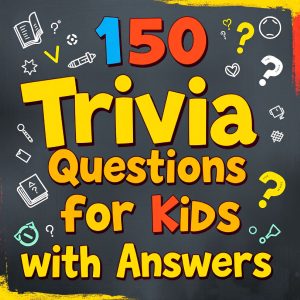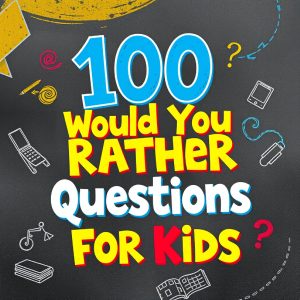In today’s fast-paced digital world, where children are exposed to screens from a young age, it’s crucial to harness technology’s potential for positive impact. Early childhood education sets the foundation for a lifelong love of learning, and educational apps have emerged as a powerful tool to supplement traditional teaching methods. These interactive and engaging learning apps for kids offer a fun and effective way to introduce core concepts, stimulate curiosity, and foster a thirst for knowledge in young minds.
From improving cognitive skills and problem-solving abilities to enhancing creativity and critical thinking, educational apps provide numerous benefits for children. Moreover, they cater to diverse learning styles, allowing each child to progress at their own pace in a safe and supportive environment. In this article, we’ve curated a list of 40 best educational apps for kids that span various age groups and subject areas, ensuring there’s something for every young learner. Join us as we explore these fantastic learning apps that can help your child embark on an exciting educational journey.

I. Apps for Toddlers (Ages 2-4)
Focus: Early learning concepts, sensory exploration, motor skills development.
Alphabet and Numbers
Endless Alphabet: This app makes learning letters and vocabulary fun with interactive animations and puzzles. Each letter comes to life, helping children associate letters with words and sounds.
- Age: 2-5
- Subject Focus: Alphabet, Vocabulary
- Pros: Engaging animations, simple interface, no ads or in-app purchases
- Cons: Limited letter selection in the free version
- Availability: Android, iOS
- Pricing: Freemium
Moose Math: Join Moose on an adventure through the forest, learning counting, addition, subtraction, geometry, and more through fun games and activities.
- Age: 3-7
- Subject Focus: Math
- Pros: Playful approach to math, aligns with Common Core standards
- Cons: Some activities might be challenging for younger toddlers
- Availability: Android, iOS
- Pricing: Free
123 Numbers – Counting & Tracing: This app helps toddlers learn to count and recognize numbers through interactive tracing activities and games.
- Age: 2-5
- Subject Focus: Numbers, Counting, Tracing
- Pros: Simple and intuitive interface, colorful graphics, positive reinforcement
- Cons: Limited activities in the free version
- Availability: Android, iOS
- Pricing: Freemium
Puzzle Kids – Animals Shapes and Jigsaw Puzzles: Introduce toddlers to various animal shapes and puzzles, promoting shape recognition and problem-solving skills.
- Age: 2-5
- Subject Focus: Shapes, Puzzles, Animals
- Pros: Variety of puzzles, colorful visuals, develops fine motor skills
- Cons: Some puzzles might be challenging for younger toddlers
- Availability: Android, iOS
- Pricing: Free (with ads)
Early Reading and Vocabulary
Homer Learn & Grow: This app offers personalized learning pathways with interactive stories, games, and songs to help toddlers build early reading and vocabulary skills.
- Age: 2-8
- Subject Focus: Reading, Vocabulary
- Pros: Adaptive learning, covers a wide range of skills, parent progress reports
- Cons: Requires a subscription
- Availability: Android, iOS
- Pricing: Paid
Montessori Preschool: Inspired by the Montessori method, this app introduces early reading concepts through activities that focus on letter sounds, phonics, and word building.
- Age: 3-5
- Subject Focus: Reading, Phonics
- Pros: Montessori-based approach, beautiful visuals, calming music
- Cons: Can be a bit slow-paced for some children
- Availability: Android, iOS
- Pricing: Paid
Khan Academy Kids: This free app offers a comprehensive library of interactive activities, stories, and videos to support early literacy and numeracy skills.
- Age: 2-8
- Subject Focus: Reading, Math, Social-Emotional Learning
- Pros: Completely free, no ads, wide range of activities
- Cons: Can be overwhelming with the amount of content
- Availability: Android, iOS
- Pricing: Free
Creativity and Imagination
Toca Boca World: A digital playground where toddlers can explore different locations, create stories, and interact with a variety of characters and objects.
- Age: 3+
- Subject Focus: Creativity, Imagination, Storytelling
- Pros: Open-ended play, encourages exploration and experimentation
- Cons: Some in-app purchases for additional locations
- Availability: Android, iOS
- Pricing: Freemium
Sago Mini Friends: Join Harvey, Jinja, Robin, and Jack on fun adventures, visiting their homes, playing games, and sharing meals.
- Age: 2-5
- Subject Focus: Creativity, Social Skills, Imagination
- Pros: Adorable characters, gentle and positive interactions
- Cons: Limited activities in the free version
- Availability: Android, iOS
- Pricing: Freemium
Crayola Create and Play: This app offers a variety of coloring pages, drawing tools, and interactive games to unleash toddlers’ creativity.
- Age: 3+
- Subject Focus: Creativity, Art, Drawing
- Pros: Wide range of activities, encourages self-expression, no ads
- Cons: Requires a subscription
- Availability: Android, iOS
- Pricing: Paid
Motor Skills and Coordination
Busy Shapes 2: A colorful puzzle game that challenges toddlers to match shapes, developing hand-eye coordination and spatial reasoning.
- Age: 2-5
- Subject Focus: Motor Skills, Problem Solving
- Pros: Simple yet engaging, beautiful design, no ads or in-app purchases
- Cons: Can be a bit repetitive after a while
- Availability: iOS
- Pricing: Paid
Drawing for Kids: A drawing app with simple tools and a variety of colors, encouraging toddlers to express their creativity and develop fine motor skills.
- Age: 2+
- Subject Focus: Creativity, Motor Skills
- Pros: Easy-to-use interface, fun sound effects
- Cons: Ads in the free version
- Availability: Android
- Pricing: Freemium
II. Apps for Preschoolers (Ages 4-6)
Focus: Building on foundational skills, expanding vocabulary, introducing basic math and science concepts.
Reading and Language Skills
Epic!: This app offers a vast digital library with thousands of books, audiobooks, and videos for kids, fostering a love for reading and expanding vocabulary.
- Age: 2-12
- Subject Focus: Reading, Vocabulary
- Pros: Huge selection of books, personalized recommendations, offline reading
- Cons: Requires a subscription for full access
- Availability: Android, iOS
- Pricing: Freemium
Teach Your Monster to Read: A fun and engaging game that teaches phonics and reading skills through interactive activities and challenges.
- Age: 3-6
- Subject Focus: Reading, Phonics
- Pros: Game-based learning, tracks progress, aligns with UK curriculum
- Cons: Can be a bit repetitive for some children
- Availability: Android, iOS, Web
- Pricing: Free
Writing Wizard for Kids: This app helps preschoolers practice tracing letters and numbers, gradually progressing to writing words and sentences.
- Age: 3-7
- Subject Focus: Writing, Handwriting
- Pros: Customizable tracing exercises, fun rewards system, progress tracking
- Cons: Some features require in-app purchases
- Availability: Android, iOS
- Pricing: Freemium
Math and Logic
Prodigy Math Game: An engaging math game where kids embark on quests, solve puzzles, and battle monsters while learning essential math skills.
- Age: 6-14
- Subject Focus: Math
- Pros: Adaptive learning, aligns with curriculum standards, motivates through gameplay
- Cons: Some features require a subscription
- Availability: Android, iOS, Web
- Pricing: Freemium
Todo Math: This app covers a wide range of math topics with interactive games, puzzles, and activities, making learning fun and engaging.
- Age: 3-8
- Subject Focus: Math
- Pros: Comprehensive math curriculum, customizable learning plans, progress tracking
- Cons: Some activities might be challenging for younger preschoolers
- Availability: Android, iOS
- Pricing: Freemium
DragonBox Numbers: Introduce basic number sense and arithmetic through playful interactions with colorful number blocks.
- Age: 4-8
- Subject Focus: Math, Number Sense
- Pros: Intuitive interface, no reading required, encourages exploration
- Cons: Can be a bit pricey
- Availability: Android, iOS
- Pricing: Paid
Science and Exploration
The Cat in the Hat Builds That: Based on the Dr. Seuss book, this app encourages kids to experiment with simple machines and engineering concepts.
- Age: 4-7
- Subject Focus: Science, Engineering
- Pros: Fun and interactive, promotes problem-solving and critical thinking
- Cons: Can be a bit short in terms of content
- Availability: Android, iOS
- Pricing: Paid
Tinybop: The Human Body: Explore the human body with interactive animations and detailed illustrations, learning about different organs and systems.
- Age: 4+
- Subject Focus: Science, Human Body
- Pros: Beautiful visuals, encourages curiosity, no ads or in-app purchases
- Cons: Can be a bit text-heavy for younger preschoolers
- Availability: Android, iOS
- Pricing: Paid
Sky Map: Turn your device into a virtual planetarium, identifying stars, constellations, and planets in the night sky.
- Age: All ages
- Subject Focus: Science, Astronomy
- Pros: Completely free, easy to use, great for stargazing
- Cons: Requires a clear view of the sky
- Availability: Android
- Pricing: Free
Social-Emotional Development
Daniel Tiger’s Grr-ific Feelings: Help Daniel Tiger and his friends navigate various emotions and social situations through interactive stories and games.
- Age: 2-5
- Subject Focus: Social-Emotional Learning
- Pros: Familiar characters, teaches valuable lessons about feelings and friendships
- Cons: Limited activities in the free version
- Availability: Android, iOS
- Pricing: Freemium
Breathe, Think, Do with Sesame: Learn calming techniques and problem-solving strategies with Sesame Street characters through interactive games and animations.
- Age: 2-5
- Subject Focus: Social-Emotional Learning, Mindfulness
- Pros: Teaches coping skills, encourages self-regulation, completely free
- Cons: Some activities might be too simple for older preschoolers
- Availability: Android, iOS
- Pricing: Free
III. Apps for Elementary School (Ages 6-10)
Focus: Reinforcing academic skills, fostering independent learning, and promoting critical thinking.
Math and Science
Khan Academy: This comprehensive app offers a vast library of lessons and exercises covering math, science, and other subjects, allowing elementary schoolers to learn at their own pace.
- Age: All ages
- Subject Focus: Math, Science, Humanities
- Pros: Completely free, personalized learning pathways, progress tracking
- Cons: Can be a bit text-heavy for younger learners
- Availability: Android, iOS, Web
- Pricing: Free
Mystery Science: Engage children with interactive science lessons and experiments that explore fascinating topics like the solar system, weather patterns, and animal adaptations.
- Age: 5-10
- Subject Focus: Science
- Pros: Hands-on activities, fosters curiosity, teacher resources available
- Cons: Requires a subscription for full access
- Availability: Web (with some mobile compatibility)
- Pricing: Paid
Mathletics: This app combines gamified learning with a structured math curriculum, helping elementary students master key concepts and improve their problem-solving skills.
- Age: 5-16
- Subject Focus: Math
- Pros: Adaptive learning, aligned with curriculum standards, rewards and incentives
- Cons: Requires a subscription
- Availability: Android, iOS, Web
- Pricing: Paid
Reading and Writing
ReadingIQ: A digital library with thousands of books categorized by reading level and interest, helping children develop reading fluency and comprehension skills.
- Age: 2-12
- Subject Focus: Reading
- Pros: Huge selection of books, leveled reading, progress tracking
- Cons: Requires a subscription
- Availability: Android, iOS
- Pricing: Paid
Storybird: This app sparks creativity and encourages writing through interactive storytelling prompts and beautiful illustrations.
- Age: 6+
- Subject Focus: Writing, Creativity
- Pros: Inspires imagination, collaborative storytelling features, publishing options
- Cons: Some features require a subscription
- Availability: iOS, Web
- Pricing: Freemium
Grammaropolis: Learn grammar rules and parts of speech through engaging animations and interactive games, making grammar fun and accessible.
- Age: 8-12
- Subject Focus: Grammar
- Pros: Visual learning, reinforces grammar concepts, catchy songs
- Cons: Can be a bit silly for older elementary students
- Availability: iOS
- Pricing: Paid
Coding and STEM
ScratchJr: A visual programming language designed for young children, allowing them to create interactive stories, games, and animations.
- Age: 5-7
- Subject Focus: Coding, Creativity
- Pros: Completely free, intuitive interface, fosters problem-solving skills
- Cons: Can be challenging for some children to grasp initially
- Availability: Android, iOS
- Pricing: Free
LEGO Education SPIKE Prime: Combine LEGO building with coding to create and program robots, encouraging hands-on learning and STEM exploration.
- Age: 10+
- Subject Focus: Coding, Robotics, STEM
- Pros: Engaging and hands-on, promotes teamwork and collaboration
- Cons: Requires purchasing the LEGO SPIKE Prime set
- Availability: iOS, Android, Windows, Mac, Chromebook
- Pricing: App is free, LEGO set is paid
Tynker: This app offers a variety of coding courses and games, teaching children to code using popular programming languages like Python and JavaScript.
- Age: 5+
- Subject Focus: Coding
- Pros: Wide range of courses, gamified learning, progress tracking
- Cons: Requires a subscription for full access
- Availability: Android, iOS, Web
- Pricing: Freemium
Language Learning
Duolingo: A popular language-learning app that makes learning a new language fun and accessible through bite-sized lessons and gamified challenges.
- Age: All ages
- Subject Focus: Language Learning
- Pros: Free to use, wide variety of languages, progress tracking
- Cons: Can be repetitive for some learners
- Availability: Android, iOS, Web
- Pricing: Freemium
Gus on the Go: Learn a new language through interactive stories and games featuring Gus the owl and his friends.
- Age: 3-8
- Subject Focus: Language Learning
- Pros: Engaging stories, focus on vocabulary and pronunciation
- Cons: Limited number of languages available
- Availability: Android, iOS
- Pricing: Paid
Little Pim: Introduce young children to a new language through short videos featuring real kids and everyday vocabulary.
- Age: 0-6
- Subject Focus: Language Learning
- Pros: Immersion-based approach, focus on early language acquisition
- Cons: Can be a bit pricey
- Availability: Android, iOS
- Pricing: Paid
IV. Apps for Specific Learning Needs
Focus: Providing tailored support for children with dyslexia, ADHD, or other learning challenges.
Dyslexia Support
Dyslexia Quest: A comprehensive app that assesses and supports children with dyslexia through multisensory games and activities that improve phonological awareness, reading fluency, and comprehension.
- Age: 7-11
- Subject Focus: Dyslexia Support, Reading
- Pros: Evidence-based approach, personalized learning plans, progress tracking
- Cons: Can be a bit pricey
- Availability: iOS
- Pricing: Paid
Nessy Reading & Spelling: This app uses a multisensory approach to teach phonics, reading, and spelling skills, making learning fun and engaging for children with dyslexia.
- Age: 5-11
- Subject Focus: Dyslexia Support, Reading, Spelling
- Pros: Engaging games and activities, personalized learning, progress tracking
- Cons: Requires a subscription
- Availability: Android, iOS, Web
- Pricing: Paid
Poio: A gamified reading app that helps children learn to read through interactive stories and activities, focusing on phonics and word recognition.
- Age: 3-7
- Subject Focus: Dyslexia Support, Reading
- Pros: Playful and engaging, self-paced learning, no in-app purchases
- Cons: Limited language support (currently only available in English and Norwegian)
- Availability: iOS
- Pricing: Paid
ADHD Support
Forest: Stay focused and productive by planting virtual trees that grow while you work. If you leave the app, your tree dies, encouraging you to stay on task.
- Age: All ages
- Subject Focus: Focus, Productivity
- Pros: Simple and effective, gamified approach, customizable settings
- Cons: Can be a bit too restrictive for some users
- Availability: Android, iOS
- Pricing: Paid
Habitica: Turn your to-do list into a role-playing game, earning rewards and leveling up as you complete tasks and build positive habits.
- Age: 13+ (recommended)
- Subject Focus: Task Management, Habit Building
- Pros: Gamified approach, customizable rewards, social features
- Cons: Can be overwhelming for younger users
- Availability: Android, iOS, Web
- Pricing: Freemium
Time Timer: A visual timer that helps children understand the concept of time and stay on track with tasks and activities.
- Age: All ages
- Subject Focus: Time Management
- Pros: Simple and intuitive, customizable colors and sounds, multiple timer options
- Cons: The physical Time Timer is more effective for some users
- Availability: Android, iOS
- Pricing: Paid
Other Learning Challenges
Otsimo: A personalized learning app for children with autism, offering a wide range of interactive activities and games that focus on communication, social skills, and cognitive development.
- Age: 2+
- Subject Focus: Autism Support, Communication, Social Skills
- Pros: Data-driven progress tracking, customizable learning plans, parent resources
- Cons: Requires a subscription
- Availability: Android, iOS
- Pricing: Paid
Proloquo2Go: A symbol-based communication app that helps individuals with speech and language impairments express themselves and communicate effectively.
- Age: All ages
- Subject Focus: Communication, Speech and Language Impairments
- Pros: Customizable vocabulary, natural-sounding voices, AAC compatibility
- Cons: Can be expensive
- Availability: iOS
- Pricing: Paid
Avaz AAC: Another augmentative and alternative communication (AAC) app that helps individuals with communication challenges express themselves using symbols, pictures, and text-to-speech.
- Age: All ages
- Subject Focus: Communication, AAC
- Pros: User-friendly interface, customizable vocabulary, multiple access methods
- Cons: Requires a subscription
- Availability: Android, iOS
- Pricing: Paid
Tips for Parents and Educators
While educational apps offer numerous benefits, it’s important to use them thoughtfully and intentionally. Here are some tips for parents and educators:
Guidance on Integrating Apps into Learning
- Choose the Right App:
- Consider your child’s age, interests, and learning style.
- Look for apps that align with your child’s developmental needs and curriculum goals.
- Read reviews and check ratings to ensure the app is high-quality and age-appropriate.
- Try out free versions or demos before purchasing paid apps.
- Set Time Limits and Balance Screen Time:
- Establish clear guidelines for how much time your child can spend on educational apps each day.
- Encourage a balance of screen time and other activities, such as outdoor play, reading, and creative pursuits.
- Use parental control tools or app timers to manage screen time effectively.
- Encourage Active Engagement:
- Talk to your child about what they’re learning from the app.
- Ask questions and encourage them to explain concepts in their own words.
- Play alongside your child and participate in the app activities together.
- Use the app as a springboard for further exploration and learning offline.
Additional Tips:
- Monitor Progress: Many educational apps offer progress tracking features that allow you to see how your child is doing. Use this information to identify areas where they might need additional support or challenges.
- Make it Fun: Learning should be enjoyable! Choose apps that are engaging and interactive, and encourage your child to explore and experiment.
- Be Patient: Remember that every child learns at their own pace. Don’t get discouraged if your child doesn’t master a concept immediately. Just keep encouraging them and providing support.
Remember:
- Technology is a tool, not a replacement for traditional learning experiences.
- Use educational apps as a supplement to, not a substitute for, real-world interactions and hands-on activities.
- The most important thing is to foster a love of learning in your child and support their curiosity and exploration.
By following these tips, parents and educators can effectively leverage educational apps to create a rich and rewarding learning environment for children.

Conclusion
In an era where technology is woven into the fabric of our daily lives, educational apps present a remarkable opportunity to inspire and empower young minds. These digital tools, carefully curated and thoughtfully integrated, can ignite a passion for learning, cultivate critical thinking skills, and unlock the full potential of every child.
From fostering early literacy and numeracy to sparking curiosity about science and the world around us, the apps showcased in this article offer a wealth of resources for children of all ages and learning styles. By choosing apps that align with your child’s interests and developmental needs, you can create a personalized and enriching learning experience that complements traditional education.
Remember, the most effective use of educational apps involves active parental or educator participation. Engage with your child, ask questions, and celebrate their achievements. By fostering a supportive and collaborative environment, you’ll nurture a lifelong love of learning that extends far beyond the screen.
We encourage you to explore the apps featured in this article and discover the ones that resonate most with your child. We also value your feedback and insights. Please feel free to share your experiences with educational apps in the comments below or suggest additional apps you’d like us to review in the future. Let’s work together to build a brighter future for our children, one app at a time.
Got it, let’s retain the question-and-answer format, keeping the questions bold and separate, while ensuring the answers are written in a flowing paragraph style:
FAQs About Educational Apps for Kids
Discover answers to common questions about educational apps for kids. Find out how these tools enhance learning and fun for children.
1. What should I look for in an educational app?
When choosing an educational app, prioritize age appropriateness, educational value, engagement, and safety. Make sure the app is suitable for your child’s age and developmental stage. Look for apps that focus on specific skills or subjects and align with your child’s learning goals. To keep your child motivated, choose apps that are interactive, fun, and visually appealing. Always check reviews and ratings, and ensure the app has robust privacy settings.
2. Are these apps safe for children?
Rest assured, most reputable educational apps prioritize children’s safety. They adhere to strict privacy policies, offer content free of inappropriate material and excessive advertising, and often provide parental control features. However, it’s always recommended to supervise your child’s app usage, especially for younger children.
3. How can I evaluate the educational value of an app?
To gauge an app’s educational merit, consider its alignment with curriculum standards and clearly stated learning outcomes. Look for descriptions of the skills and concepts the app aims to teach. Expert recommendations and positive reviews from other parents and educators can also be helpful indicators of an app’s effectiveness.
4. How much screen time is appropriate for my child?
Finding the right balance of screen time is crucial. Refer to age-specific guidelines from trusted organizations like the American Academy of Pediatrics and ensure screen time is complemented by other activities that promote physical, social, and emotional development. Remember, quality over quantity is key – choose apps that offer meaningful learning experiences.
5. Can educational apps replace traditional learning methods?
Educational apps are best used as a supplement to, not a replacement for, traditional learning methods like classroom instruction and hands-on activities. Embrace a blended learning approach that combines app-based learning with real-world experiences for a well-rounded education.
6. How can I make app-based learning more effective?
Actively participate in your child’s app-based learning experience. Engage with them, ask questions, and discuss what they’re learning. Help them connect the concepts they learn in the app to real-life situations. Offer a variety of apps to cater to their diverse interests and learning styles.
7. What if my child gets frustrated with an app?
If your child encounters frustration, provide support and guidance. Break down challenging tasks into smaller, more manageable steps. If an app continues to cause frustration, try a different one that might be a better fit for their learning style. Sometimes, taking a break from screen time and engaging in other activities can also be helpful.
8. Are there any free educational apps available?
Yes, there are many high-quality educational apps available for free or with free versions that offer limited features. Do some research to find free apps that align with your child’s needs and interests.
9. How can I ensure my child’s privacy while using educational apps?
Protecting your child’s privacy is paramount. Carefully read the app’s privacy policy to understand how your child’s data is collected and used. Be mindful of the permissions an app requests and only grant access to necessary features. Download apps from reputable app stores and developers.
10. Can educational apps help children with special needs?
Absolutely. Many apps are specifically designed to support children with learning challenges, such as dyslexia, ADHD, and autism spectrum disorder. These apps offer features like multisensory learning, adaptive feedback, and personalized learning plans to cater to their unique needs.
If you have any further questions or concerns, don’t hesitate to reach out to app developers or educational experts for guidance.




